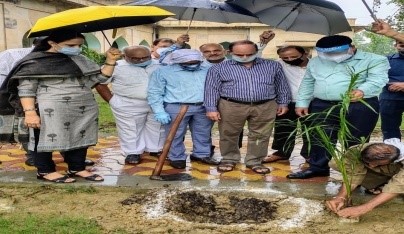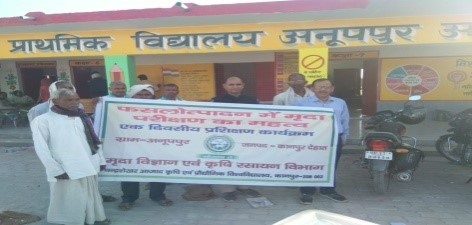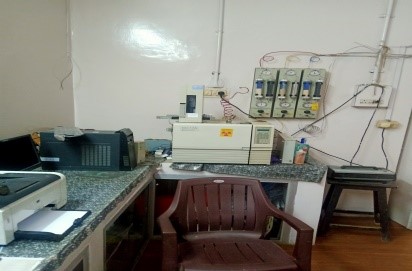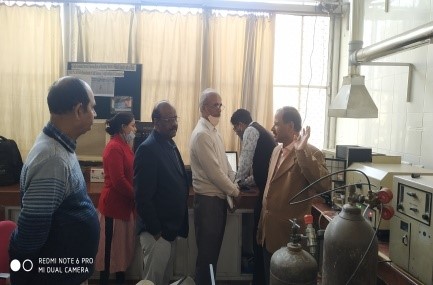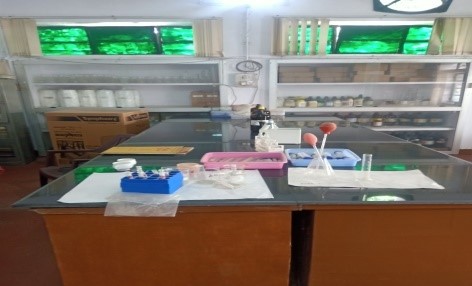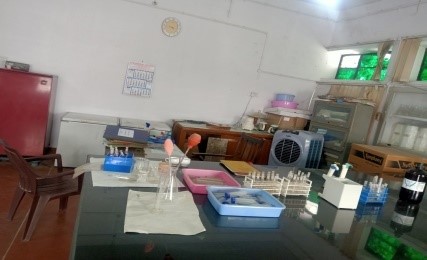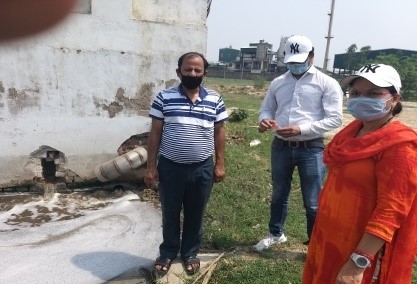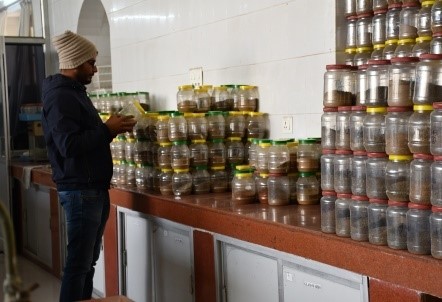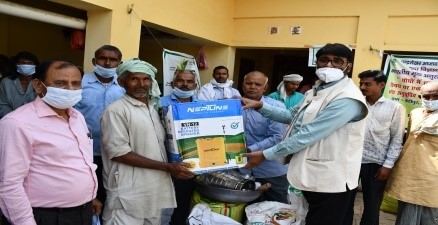About Department
- The present Department of Soil Science and Agricultural Chemistry is an outcome of a steady metamorphosis from an old and rich heritage of the past and has made excellent contribution in the domain of soil and plant research.
- The research component of the Department is one of the oldest one in the country starting way back in the year 1883 when the first permanent manurial cum fertilizer experiments were initiated at Kanpur to compare relative efficacy of organic manures vis a vis inorganic fertilizers on maize and wheat crops.
- Dr. J.W. Leather was appointed as the first Imperial Agricultural Chemist in 1886. This post was later re-designated as Agricultural Chemist to Govt. of U.P. and a galaxy of luminaries like Dr. G. Clarke, Dr. H.N. Batham, Dr. B.K. Mukherji, Dr. B.N. Pramanik, Dr. N.K. Das, Dr. R.R. Agarwal and Dr. C.L. Mehrotra occupied the coveted chair.
- Other Scientists making excellent contributions in soil and plant research of the Department during the years include Dr. B.N.P. Ghildayal, PadamshriDr. J.S.P. Yadav, Dr. A.N. Pathak, Dr. R.N. Gupta, Dr. K.N. Tiwari & Dr.R.M. Upadhyay.
- Teaching of Soil Science and Agricultural Chemistry at graduate level in Govt. Agricultural College, Kanpur came into its being in 1930 followed by Postgraduate classes and Ph.D degree research in 1944 under the stewardship of the eminent scientist Professor Dr. J.G. ShriKhande in 1944 succeeded by his illustrious student Dr. A.N. Pathak in 1958. Dr. A.N. Pathak succeeded him to occupy the position till 1987. thereafter, Dr. Hari Shanker, Dr. Kalian Singh, Dr. K.N. Tiwari, Dr. P. Shukla, Dr. R.K. Pathak, Dr. M.M. Agarwal and Dr. B.R. Gupta, Dr. K. N. Dwivedi, Dr.C.P.Sharma, Dr. Samir Pal ,Dr. D. D. Tiwari, Dr. R.C. Nigam and presently Dr. Ravindra Kumar steered the teaching, research and extension activities of the Department as Professor and Head of the Department.
- The research and teaching components functioning as independent units were merged into one Division with the upgradation of Govt. Agricultural College, Kanpur as U.P. Institute of Agricultural Science Kanpur, which was subsequently elevated to the status of an independent University in 1975 as C.S.Azad University of Agriculture & Technology, Kanpur and the erstwhile Division of Soils &Agril. Chemistry in the Institute was rechristened as Department of Soil Science and Agricultural Chemistry now in vogue.
| Head of the Department |
Dr. Ravindra Kumar |
Information Of Officer
| Sl. No. |
Name |
Designation |
Telephone/ Mobile |
E-mail |
| 1 |
Dr. Ravindra Kumar |
Head of Department |
9453139285 |
ravindracsa@gmail. com |
| 2 |
Dr. Anil Kumar |
Professor |
8707771873 |
sachananil2000@gmail.com |
| 3 |
Dr. R.K. Pandey |
Asstt. Professor |
7376141699 |
Pandey2008rk@rediffmail.com |
| 4 |
Dr. Sushil Dimree |
Asstt. Professor |
9839083928 |
Drsushildimree @ gmail. com |
| 5 |
Dr. S.D. Dubey |
Asstt. Professor |
9451286709 |
sduttdubey@ rediffmail.com |
| 6 |
Dr. S.B. Pandey |
Asstt. Professor |
9794828476 |
sbipa2014@gamil.com |
| 7 |
Dr. U.S. Tiwari |
Asstt. Professor |
9450162802 |
tiwari_us2009@yahoo.co.in |
| 8 |
Dr. Devendra Singh |
Asstt. Professor |
9450136063 |
dsyadu@gmail. com |
Different activities of the department
Mission:
To develop best human resource in the field of soil science and agricultural chemistry.To promote soil science and agriculture chemistry education and research to disseminate knowledge in agriculture.To maintain the soil health and integrate all the three function viz. education, research and extension services for sustainable development of agriculture. To impart the instructions in the area of conventional and modern tools of crop improvement so that one can perform its duties.
Mandate:
- Teaching of B.Sc (Ag), M.Sc (Ag) and Ph.D courses.
- Basic and applied research involving MSc and Ph.D students.
- Motivate students for their bright carriers.
- Development of different technologies to maintain the fertility status of soil.
- Development of technologies for reclamation of saline and sodic soils.
- Development of technologies for utilization of waste and poor quality water for sustainable crop production.
- Analyse the pesticides residue in different vegetable, fruit and food grains.
- Testing of fertilizers and pesticides to meet out quality standards.
- Farmers’ teaching for application of bio fertilizers and to encourage for organic farming.
Research papers:
- R. Kumar, D. Singh and A. Kumar (2017) Assessment of underground irrigation water quality of Kanpur Dehat district of Uttar Pradesh. Annals of Plant and Soil Research. 19(3):334-335.
- G. S. Yadav, D. Singh and R. Kumar (2017) Effect of Integrated Use of Organic Manures and Inorganic Fertilizers in Rice (OryzasativaL.)Journal of Pharmacognosy and Phytochemistry ; SP1: 296-298
- R. Kumar, D. Singh and V. P. Yadav (2018) Quality of Underground Irrigation Water of Fatehpur District, Uttar Pradesh. An International Referred Peer Reviewed and Indexed Quarterly Journal in Science, Agriculture & Engineering. VOL. VIII, Issued Special (E), August 2018, 306-308.
- R. Kumar, D. Singh and V. P. Yadav (2018) Effect of RSC Water, Using Different Ameliorants on Crop Production and Soil Fertility in Sodic Soil. An International Referred Peer Reviewed and Indexed Quarterly Journal in Science, Agriculture & Engineering.VOL. VIII, Issued Special (E), August 2018, 303-305.
- R. Kumar, D. Singh and V. P. Yadav (2019) Impact of CSR-Bio Microbial Culture and Chemical Fertilizers on yield , Quality and Soil Fertility of Cabbage Under Sodic Soil Conditions. Progressive Research-an International Joural14 (2): 41-43.
- R. Kumar, D. Singh and V. P. Yadav (2019) Impact of CSR-Bio Microbial Culture and Chemical Fertilizers on yield , Quality and Soil Fertility of Tomato Under Sodic Soil Conditions. Progressive Research-an International Joural14 (2): 51-53.
R. Kumar, S. N. Pandey, A. Kumar and V. P. Yadav (2019) Evaluation of Resource Conservation Technology for Rice-Wheat Cropping Sytem in Sodic Soil.Technofame- A Journal of multidisciplinary Advance research.8 (1): 85-88.
- R. Kumar, S. N. Pandey, A. Kumar and V. P. Yadav (2019) Comparative Performance of Salt Tolerent Wheat and Mustard Varieties at Different Farmers Field UnderSodic Soil Conditions. Technofame- A Journal of multidisciplinary Advance research.8 (1): 82-84.
- V.Kumar, N.Swaroop, A.A. David and T.Thomas (2020)Evaluationofnormalandsline irrigation water on chemical properties of soil in district Kannauj, Uttar Pradesh. Int. J. Chem. Stud. 8 (1): 2337-2340.
- V. Kumar, R. Kumar, D. Singh, K.N. Singh, Y. Mishra, V. Kumar and O.P.Singh. (2020) Effect of Normal Saline water Irrigation on Yield and Yield Attributes od\f maize cultiver district Kannauj Uttar Pradesh. International Journal of Chemical Studies. 8 (1): 01-06.
- V. Kumar, R. Kumar, D. Singh, K.N. Singh, Y. Mishra, V. Kumar and O.P.Singh. (2020) Assisment of Effect of Normal Saline water Irrigation on growth parameters of maize cultiver, Jasaura Village of district Kannauj Uttar Pradesh. International Journal of Chemical Studies. 8 (1): 01-10.
- R. Kumar and D. Singh (2020) Assessment of Underground Irrigation Water Quality of Araiya district of Uttar Pradesh. Annlsof Plant and Soil Research 22(2):214-215.
- A. C. Yadav, Karam Husain, V K Verma, U S Tiwari,Naushad Khan and M Z Siddiqui (2019) “Effect of Land Configuration and nutrient management on growth and yield of hybrid maize” in “Journal of Pharmacognosy and Phytochemisty” .Vol. 8 (4) : 602-606
- Ashok Kumar, R.K. Pahtak, Sanjeev Sharma, Hanuman Pd. Pandey, Manish Rao and Lalit Krishna yadav (2019) Influence of chemical fertilizers and micronutrients on nuitrient uptake and quality parameters under maize-wheat cropping system.International journal of current Microbiology and applied sciences ISSN:2319-7706 Vol (8)(12):940-949
- Ashok Kumar, R.K. Pathak, A.K. Sachan, Hanuman Pd. Pandey, Manish Rao and Lalit Krishna Yadav (2019) Response of chemical fertilizers and micronutrients on yield , yield attributes and economics under Maize – wheat cropping system International journal of current Microbiology and applied sciences ISSN:2319-7706 Vol (8) (12):931-939
- P. Mishra, U.S. Tiwari, H.P. Pandey, R.K. Pahtak., and A.K. Sachan, (2019) Effect of INM on nutrient concentration and their uptake of maize ( Zea mays) crop in central Uttar Pradesh International Journal of chemical studies 7(2) 516-24
- Priyavart Mishra, U S Tiwari, Hanuman Prasad Pandey, R K Pathak and A K Sachan (2019) “Impact of INM on Growth and Yield Of Maize (Zea mays) Crop in Central Plain Zone of Uttar Pradesh, India” in “International Journal of Current Microbiology and Applied Science” .Vol. 8 (4) : 138-150
- Priyavart Mishra, US Tiwari, Hanuman Prasad Pandey, R.K. Pathak and A.K. Sachan (2019) “Effect of INM on nutrient concentration and their uptake of maize (Zea mays) crop in central Uttar Pradesh.” in “International Journal of Chemical Studies”.7 (2) : 516-524
- Priyavart Mishra, US Tiwari, Hanuman Prasad Pandey, R.K. Pathak and A.K. Sachan (2019) “Effect of INM on Physico-chemical properties of soil of maize (Zea mays) crop in Inceptisol of Central U.P.” in “International Journal of Chemical Studies” .Vol. 7 (2): 631-635.
- U. S. Tiwari, S. D. Dubey, R. K. Pandey, Karam Husain and Jitendra Singh (2019) Effect of intrigated nutrient management on productivity, profitability and quality of wheat (Triticumaestivum L.) in central plain zone of Uttar Pradesh, International Journal of Chemical Studies 7 (3): 1825-1828
- Verma AK, Yadav P.N., Awasthi, U.D., Pathak, R.K., Rahul Ranjan and Dhankad G.N. (2019) Response of Root development and quality parameters on linseed ( LinumUsitatissimum L.) based intercropping systemsas influenced by integrated nutrient management under rainfed condition. Bulletin of Environment, pharmacology and life sciencesVol.18(6): 96-100.
- A.K. Shukla, S.K. Behera and A.K. Sachan (2020) Pre monsoon spatial distribution of available micronutrients and sulphur in surface soils and their management zones in India Indo gangetic plain. Plos ONE 15 (6) :0234053.
- Nikhil Singh, S.B. Pandey, Rahul Ranjan, A K Verma, R.K. Pathak, N. Rajput, S. Dubey and R. Singh (2020) Integrated use of organic ( FYM) in organic and biofertilizer ( PSB) on productivity nutrient uptake by wheat and soil properties. The pharma Innovation Journal 9 (3) : 345-347
- Shubham Maurya, M.P. Pandey, R.K. Pathak, A.K. Verma, Rahul Ranjan A Pal., V. Gangwar, and N. Rajput (2020) Integrated nutrient management of mustard ( BarassicJuncia L.) in alluvial soils of Uttar Pradesh) Internation journal of chemical stadies 8(1):1386-1389
Awards
| Scientist |
Award |
Confirm |
| Dr S. D. Dubey
|
Best Poster presentation
|
National conference on organic farming for sustainable agriculture and livelihood society under changing climatic condition. Organized by C. S. A. Univ. of Ag and Tech. Kanpur during Dec. 12-13, 2017. |
| Dr. R.K.Pathak
|
Best research paper presentation award
|
National conference on Managing natural resources for sustainable Agriculture-2018, organised by GKV Society Agra from 8-12-18 to 9.12.18.
|
| Dr. R.K.Pathak
|
Outstanding Scientist Award
|
National conference on Managing Natural Resources for sustainable agriculture-2018 organized by GKV Society Agra from 8-9.12.2019at RBS College, Agra.
|
| Dr. R.K.Pathak
|
Eminent Scientist Award Kanpur
|
International conference on Advance in Agriculture and Allied Science Research-2019 from 23 -24.02.2019 SVWS, Lucknow at Rama University. |
| Dr. Anil Kumar |
Best Research Scientist Award
|
International conference on Global Research Initiatives for sustainable Agriculture & Allied Sciences ( GRISAAS-2018) organized by Astha foundation, Meerut (U.P) during 28-30 October,2018 held at Rajasthan Agriculture Research Institute, Durgapura, Jaipur, Raj.India,
|
| Dr. Anil Kumar
|
Eminent Scientist Award
|
International Conference on Advances in Agriculture and Allied Science Research Organized by Rama University, Kanpur and SamagraVikas Welfare Society, Lucknow at Rama University, Kanpur during 23-24 Feb,2019
|
| Dr. S.B.Pandey
|
Second paper presentation award
|
International conference on sustainability and small holder agriculture in developing countries under changing climatic scenario 14-17 Feb.2018
|
| Dr. Devendra Singh |
Excellence research award |
National conference on innovative and current advances in agriculture and allied sciences, held at Bangkok, Thailand during 27 January -01 February 2020
|
| Dr. Devendra Singh |
Best teacher award |
National conference on recent trends and new frontiers in biotechnological, agriculture, science and environment held at department of botany, ST. Johns collage Agra during 22-23 February 2020. |
Dignitaries visited:
- Dr. D. K. Sharma, Director CSSRI, Karnal, Haryana.
- Dr. S.K.bansal, Director IPRI, Gurugram, Haryana.
- Dr. V.K. Mishra, Incharge, CSSRI, ARS, Lucknow, U.P.
- Dr. Arvind Kumar Shukla, Project Coordinator ( MNS) IISS, Bhopal. M.P.
- Dr. M.J. Kaledhonakar ,P.C., CSSRI, Karnal, Haryana.
- Dr. P.K. Sharma, Vice-Chancellor, Sere Kashmir Univ. Jammu.
Foreign Exposure:
Dr. Devendra Singh
Research paper presented at Bangkok, Thailand i.e. Effect of organic amendments on productivity of rice-wheat cropping system and soil properties under sodic soil condition. International conference on innovative and current advances in agriculture and allied sciences, held at Bangkok, 10400, Thailand. During 27 January – 01 February, 2020.
Facilities:
- Soil testing facilities along with suggestion for application of balanced fertilizer as per soil test by the scientists of the department.
- Quality Testing of Pesticides, Fertilizer and Manures.
- Production of Bio fertilizer like Azotobacter, Rhizobium and PSB. These produce are available to farmers at nominal price i.e. Rs.20/- per pkt.
- Experiential learning for B.Sc. Ag students regarding bio fertilizers production.
- Central Instrumental Laboratory (CIL) established in this Department
- Well equipped Laboratories for practical works of the B.Sc. Ag (Hon’s), M.Sc. Ag and Ph.D. students.
Course offered:
| Name of the Faculty |
Name of the course |
Credit Hours |
| Agricultural Faculty: Deptt. of Soil Science and Agricultural Chemistry |
| B.Sc. Ag. (Hon’s) |
SAC-111 Fundamentals of soil science |
3(2+1) |
| SAC-121 Agricultural Microbiology |
2(1+1) |
| BSH-114 Introductory Microbiology |
2(1+1) |
| SAC-221 Problematic soils and their management, |
2(2+0) |
| UGE-222 Agro Chemicals |
3(2+1) |
| SAC-311 Manures, fertilizer and soil fertility management, |
3(2+1) |
| UGE-312 Biopesticides and Biofertilizer |
3(2+1) |
| ELP-421Production Technology of Biofertilizer |
10(0+10) |
| AEX-411 RAWE |
2(0+2) |
| NRH-111 Fundamental of Soil Science |
2(1+1) |
| NRH-221Soil Water and Plant Analysis |
2(1+1) |
| NRH-121 Soil fertility and management |
2(1+1) |
| M.Sc. Ag. |
SAC-501 Soil Physics |
3(2+1) |
| SAC-502 Soil fertility and fertilizer use |
4(3+1) |
| SAC-503 Soil chemistry |
3(2+1) |
| SAC-504 Soil mineralogy, genesis classification and survey |
3(2+1) |
| SAC-506 Soil biology and biochemistry |
3(2+1) |
| SAC-509 Soil, water and air pollution |
3(2+1) |
| SAC-511 Analytical techniques and instrumental methods in soil and plant analysis |
2(0+2) |
| SAC-599 Seminar |
1(1+0) |
| Thesis |
20 |
| Ph.D. |
SAC-601Soil survey and land use planning |
3(2+1) |
| SAC-602Soil water plant relationship |
3(2+1) |
| SAC-603 Land degradation and restoration |
2(2+0) |
| SAC-604 System approach in soil research |
2(2+0) |
| SAC-605 Physical chemistry |
2.5(2+1/2) |
| SAC-606 Advanced agricultural microbiology |
2.5(2+1/2) |
| SAC-699 Seminar |
1(1+0) |
| Thesis |
40 |
- Manual of (UGE-222) Agrochemicals for UG students developed by Dr. S.B. Panday, Dr. R.K. Panday and Dr.Sushil Dimree.
Organogram of Department (Officer and Employee)
- Teaching Unit
- Soil Testing Unit
- Fertilizer and Pesticide Quality Testing
- Soil Microbiology Unit
- Soil Fertility
- Pesticide Residues Scheme.
Derails Of Programmes/Services/Schemes Run By The Department:
Soil Testing:
Soil samples received from farmers and other related agencies, test for plant nutrients like organic carbon, pH, EC,available NPKS, DTPA extractable Zn, Fe, Mn, and Cu etc. The test is carried out on payment basis. Fertilizer Recommendation is formulated on soil test basis for various crops.
Soil samples received on following format:
-
- Name of the farmer
- Village
- Block
- Name of the field /Khasara No.
- Source of irrigation
- Crop taken
- Fertilizer used (i) Chemical fertilizer (ii) Organic manure
- Crop grown
- Size of holding in hectare
- Signature and mobile No. of the farmer
Contact person: Prof. Ravindra Kumar, HOD, Dr. U.S. Tiwari,Asstt. Prof. and Sri Yogesh Mishra
Soil Microbiology:
Production of bio fertilizers viz. Rhizobium Azotobactor and PSB.
Contact Person: Dr.S.D. Dubey, Asstt. Prof.
Fertilizer and Pesticide Quality Testing:
Pesticide and fertilizer samples are tested by the deptt. With the objective to provide standard input (Fertilizerand Pesticide) to the farmers. Test carried out on payment basis(testing fees) which are deposited in the university account. This laboratory is first quality control laboratory of the State of U.P.
Contact person: Dr. S.B. Pandey, Asstt. Professor.
Pesticide Residues:
The field experiments conducted on various crops with different new and old molecule of insecticide. Samples collected at different intervals and also at harvest to generate pesticide residues data for calculating RL50, MRL ( Maximum residues limit and waiting period at national level . The research work in this project is carried out on the bais of mandate aloted by AINPon pesticide residues ICAR .
Contact Person: Dr. Sanjeev Sharma, Centre Incharge/Asstt. Residue Analysit.
ADHOCK PROJECTS
AICRP (MSPE):
Delineation of micro and secondary nutrients status in soils of various Districtsof Uttar Pradesh. Refinement of critical values of micro and secondary nutrient of in soils and standardization of soil test method.Monitoring of heavy metals toxicity in relation to soil plant and water continuum .
Principal Investigator: Dr Anil Kumar, SRF: Rahul Prajapati,
Project Assistant: KshitijTiwari&Prinsu Singh and Lab Assistant: DikshaShukla.
DBT & NBPGR-ICAR
Leveraging genetic resource for accelerated genetic improvement of Linseed using comprehensive genomics and phenotyping approaches of its Sub-project” 5 and component 5“Evaluation of linseed germplasm for major abiotic stress (drought and salt stress)”Principal Investigator
Principal Investigator: Dr. S.D. Dubey, Senior Research Fellow: Anand Kumar and SAA: Prajjwal Singh.
Success Stories:
-
- Farmers used to come at soil testing unit for their soil test and advice for fertilizer recommendation for various crops.
- Developed integrated nutrient management packages for Rice-wheat cropping sequence.
- Rationalizes potassium doses for oilseed (Mustard, linseed, grounnut andTil ) pulses ( Pea, Chickpea, Urd and Moong)and vegetable (cabbage, couliflower, Brinjal and ladies finger.
- Developed integrated management packages for sodic soil reclaimaion.Testedphosphogypsum as alternative source of Gypsum for sodic soil reclamation.
- Prepared vermicompost with the use of Congress grass which not only eradicate Congress grass but also nutrient rich vermicompost.
- Under AICRP on Micro secondary and pollutant elements in soil plant and water. GPS based surface soil samples from 15 district of the state (0-15cm) has been collected and analysed for micro and secondary nutrients.
- Results revealed that on an average 45%, 40% 12%samples found deficient with zinc, sulphur and boron respectively. Fe, Mn and Cu deficiency ranged from 3-4 % and this is alarming situation for these micronutrients.Zinc should be applied after two years in same field.
- The detail results are communicated to project co-ordinator AICRP (MSPE) Indian Institute of soil science Bhopal (M.P.) for preparing soil fertility map.
- Pesticide Residues data communicated to Project Coordinator AINP , IARI, New Delhi for fixing MRL, RL50 and waiting period at National level.
- Experiment on breaking yield stagnation on Rice-wheat cropping sequence is conducted and result of the experiment revealed that exclusion of P from the fertilizer scheduling significantly reduced more yield of rice and wheat both than K, S, Zn and boron.
Faculty Profile:
| Name |
: |
DR. Anil Kumar |
 |
| Date of Birth |
: |
01.04.1965 |
| Designation |
: |
Professor & Head |
| Department |
: |
Soil Science and Agricultural Chemistry |
| Contact Info |
| Office Info |
Personal Info |
Phone :
Mobile:8707771873Email :sachananil2000@gmail.com |
Phone :
Mobile:8707771873Email :sachananil2000@gmail.com |
| Name |
: |
Dr. Ravindra Kumar |
 |
| Date of Birth |
: |
06.02.1965 |
| Designation |
: |
Professor |
| College Department |
: |
Soil Science and Agricultural Chemistry |
| Contact Info |
| Office Info |
Personal Info |
Phone : –
Mobile: : 9453139285
Email : ravindracsa@gmail.com |
Phone : –
Mobile: : 9453139285
Email :ravindracsa@gmail.com |
| See More Details |
| Name |
: |
DR. Sanjeev Sharma |
|
| Date of Birth |
: |
– |
| Designation |
: |
Assistant Professor |
| Department |
: |
Soil Science and Agricultural Chemistry |
| Contact Info |
| Office Info |
Personal Info |
Phone :
Mobile:9415178267Email : |
Phone :
Mobile:9415178267 |
| Name |
: |
Dr.Shyam Bihari Pandey |
 |
| Date of Birth |
: |
11.01.1965 |
| Designation |
: |
Assistant Professor |
| College Department |
: |
Soil Science and Agricultural Chemistry |
| Contact Info |
| Office Info |
Personal Info |
Phone : –
Mobile: : 9794828476
Email : |
Phone : –
Mobile: : 9794828476
Email : |
| Contact Info |
| Office Info |
Personal Info |
| Name |
: |
Dr.Devendra Singh |
 |
| Date of Birth |
: |
08.04.1970 |
| Designation |
: |
Assistant Professor |
| College Department |
: |
Soil Science and Agricultural Chemistry |
| Contact Info |
| Office Info |
Personal Info |
Phone : –
Mobile: : 9450136063Email :dsyadu@gmail.com |
Phone : –
Mobile: : 9450136063Email :dsyadu@gmail.com |


